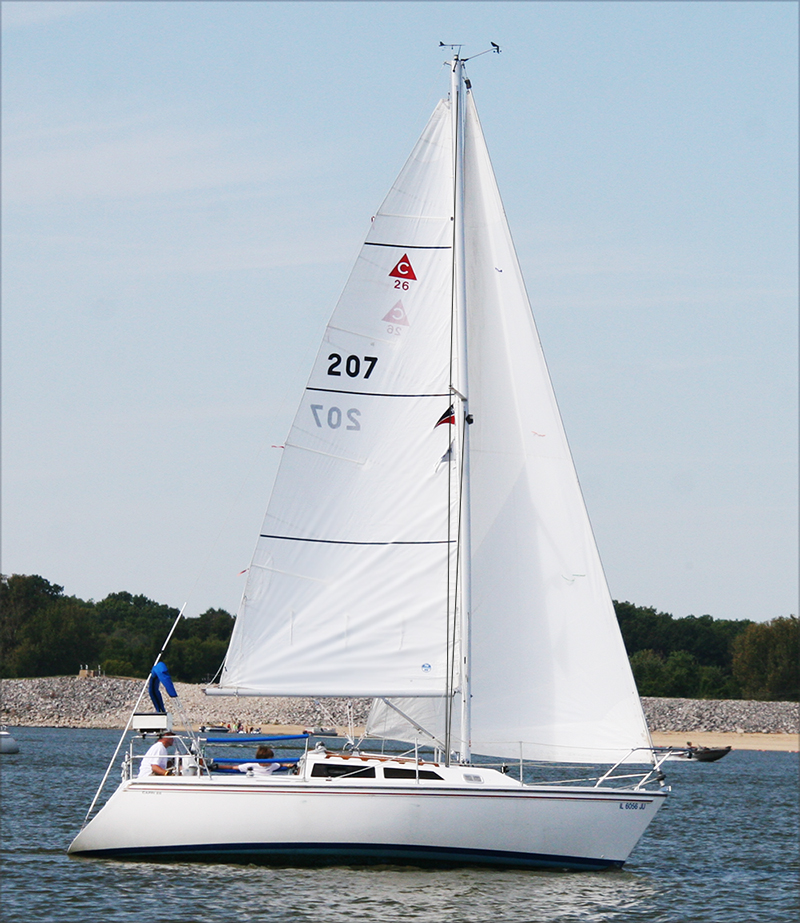
 |
| EDUCATION | CATALOG | RIGGING | CONSULTATION | HOME | CONTACT US |
|
|
|
#1
|
|||
|
|||
|
Brion/Ian,
You are correct, the stays are 3/16 and I'm not able to make any adjustments to the location of the upper chainplates. Since the mast is down for the winter, I'm unable to site up the shrouds but I was able to locate a side picture (and I highlighted the stays for better visiblity). Although it appears that the upper's are fairly straight from deck to masthead, it's now easier for me to visualize the problem that you (both) pointed out and how I might be having a problem. If I correctly understand Ian, once tension is applied on the shrouds, the shrouds will force the spreaders to "find" its angle, either fore or aft and by the signs on the spreader base, it appears that the spreaders are being forced forward resulting in the spreaders not being able to introduce pre-bend. Just to recap: Even though I'm following Catalina's spec's on loading to the tee, I'm thinking that I have too much tension on the lowers which is not allowing the mast to flex and it's forcing the spreaders forward. This should be a easy correction/fix. It now appears that I do have a problem with the spreader base from the inboard edges, to the wallowing of the clevis pin holes from years of wear. Fixing the pin holes should be straight forward but how do I ever determine the proper angle of spreaders? Or by Ian's comments, should I expect to see some swing (of the spreaders) to the aft as I tighten the shrouds but try to control any forward movement? It just seems like a delicate balancing act with swept back spreaders.  |
|
#2
|
|||
|
|||
|
Brion is far more scientific and knowledgable in tuning that I am, but on boats like this with a not particularly extreme spreader rake, I tune by first getting the head stay and back stay about right, then using the upper to center the truck. For this stage the lowers are slack. With swept spreaders, besides getting the truck centered I try to induce whatever mast bend I want. Only when that's done do I tension the lowers.
G'luck |
|
#3
|
|||
|
|||
|
Hi again,
It might be only the perspective, but it looks from the photograph that the chainplates are much further forward than in the sailplan. Wouldn't be the first time something like this has happened. It would account for the spreader root damage, assuming the roots and spreaders were built for a greater aft sweep. It would also account for your inability to bend the mast, as the sweep would have too small a forward vector to make much difference. On the other hand, the lowers would still have enough sweep to bend the middle of the mast aft. A quick Web search doesn't reveal any Capri's with chainplates further aft than yours, however. With the rig as-is, I'm with Ian: tune from the top down, and be moderate in your takeup of the lowers. Fair leads, Brion Toss |
|
#4
|
|||
|
|||
|
Brion & Ian
Thanks for all your help!!!! It was very informative. Happy Holidays Steve |
|
#5
|
|||
|
|||
|
Hello:
Here is my first post. I also have a Capri 26 and have had problems keeping the mast from inverting. I don't think my spreaders have wiggled so much but I may not have as many miles on the boat. After retuning the mast about a dozen times per the Catalina directions without any success, I (with the help of a rigger) figured out that the deck was compressing under the mast. While the mast is off the boat snug up the 4 1/4-20 screws that hold the mast step in place. I did this and when the mast was up and tuned the nuts on the bottom were loose, particularly the aft ones. My solution was to beef up the mast step area in the cabin sole and epoxy some vertical 3/8" diameter aluminum rods in the deck to take the compression load from the mast step to the compression post inside the boat. After doing this operation the mast maintained its prebend and I overstood the weather mark 2 or 3 times in the next race. There is a big hole in the deck for the mast wires and after 20 years in the rain the mast step was a little soft. I also poured lots of git-rot in the holes to hold the aluminum rods in place. The hardest part was filing the rod ends flush with the deck. Good luck and Happy Sailing Steve |
 |
| Thread Tools | |
| Display Modes | |
|
|